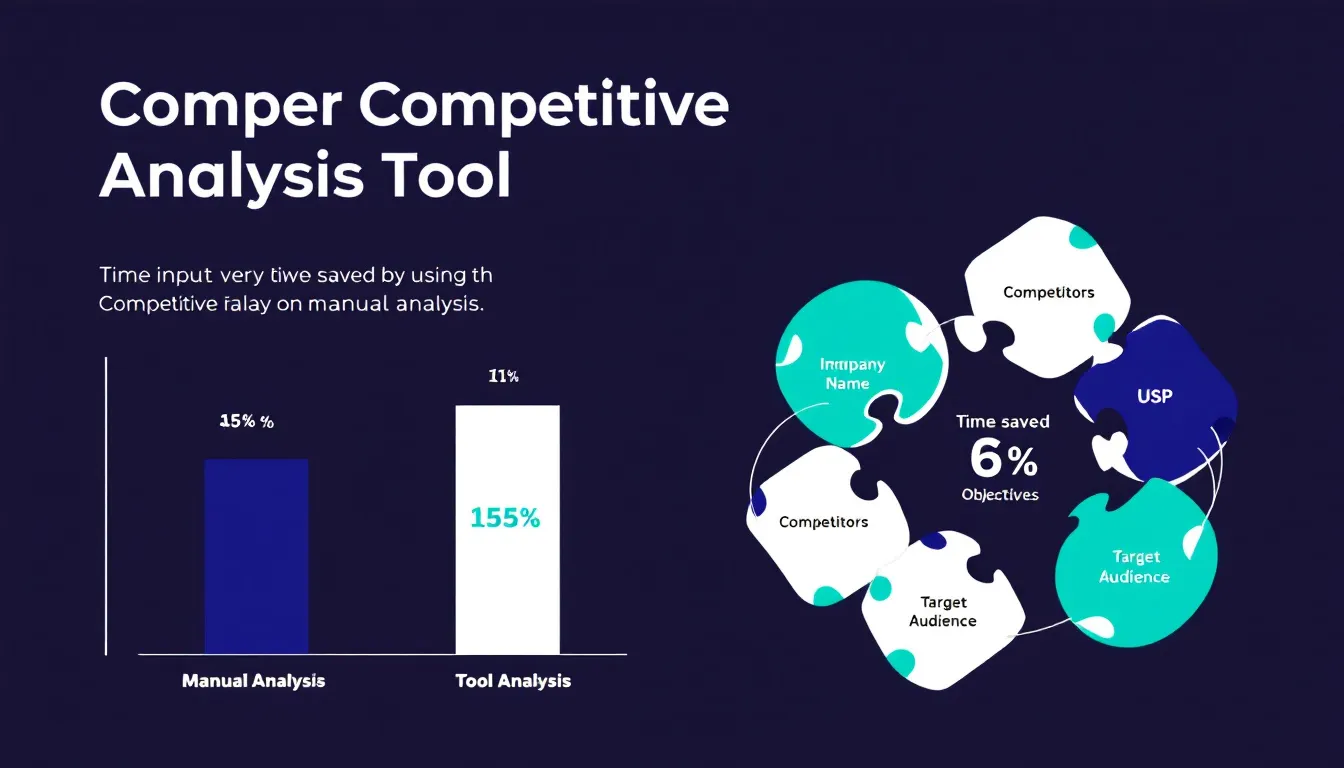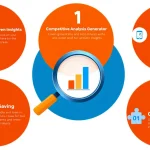Is this tool helpful?
How to Use the Competitive Analysis Tool Effectively
Use this competitive analysis tool to better understand your business environment and find new ways to stand out from your rivals. Fill in each field carefully to generate useful insights.
1. Company Name Entry
Provide your official company name. Examples:
- BlueWave Digital LLC – A digital marketing agency
- BrightHarvest Farms – A sustainable fresh produce supplier
2. Industry Selection
Specify your main industry or business sector clearly. Examples:
- Renewable Energy Solutions – For companies focused on clean energy
- Financial Technology (FinTech) – For technology-driven financial services
3. Main Competitors
List your key competitors, one on each line. Include direct and indirect competitors. Sample entries:
- EcoPower Inc.
- GreenTech Financial
- NextGen Analytics
4. Unique Selling Points
Describe what distinguishes your business from competitors. Examples:
- 24/7 live customer support
- Proprietary AI algorithms for financial forecasting
- Climate-neutral manufacturing processes
5. Target Audience
Define your primary customer base or ideal clients:
- Small and medium-sized retail businesses
- Urban millennials interested in eco-friendly products
6. Business Objectives
State your specific goals and milestones:
- Expand customer base by 50% within 12 months
- Launch two new service offerings by end of Q3
Competitive Analysis Tool Overview
This competitive analysis tool helps you evaluate your company’s position in the marketplace by comparing your business against industry rivals. You provide key data about your company, competitors, and goals, and the tool processes this information to highlight market opportunities, competitive advantages, and areas for improvement.
Key Features of the Tool
- Assess market positioning relative to competitors
- Identify strengths and weaknesses in your offerings
- Find gaps and trends in your industry
- Generate actionable recommendations for differentiation
Practical Applications of the Competitive Analysis Tool
Use this tool to support strategic business decisions, such as:
- Identifying untapped market segments for growth
- Refining product features based on competitor comparisons
- Prioritizing marketing efforts toward targeted audiences
- Planning resource allocation for maximum impact
Example Use Case: Sustainable Technology Startup
By inputting competitor data and unique selling points, a startup in renewable energy spotted areas where they could outperform larger firms, helping them secure investors and increase market share by 25% within six months.
Example Use Case: Online Retail Brand
An e-commerce brand used the tool to identify competitor weaknesses in customer service responsiveness. They adjusted their support infrastructure accordingly, improving customer retention rates by 18%.
Understanding the Analytical Framework
The tool applies structured scoring models to quantify market positioning and differentiation.
Market Position Score Calculation
This score sums weighted factors that reflect your standing in the industry:
$$ MP = \sum_{i=1}^{n} (w_i \times f_i) $$Where:
- MP = Market Position Score
- wi = Weight assigned to factor i
- fi = Score for factor i
- n = Total number of factors evaluated
Differentiation Index Formula
This index measures how distinct your selling points are compared to competitors:
$$ DI = \frac{\sum_{i=1}^{n} (USP_i \times MI_i)}{TC} $$Where:
- DI = Differentiation Index
- USPi = Strength of unique selling point i
- MIi = Market impact factor for USPi
- TC = Total number of competitors considered
Benefits of Using this Competitive Analysis Tool
1. Clear Market Insights
The tool reveals strengths and weaknesses in your market positioning, helping you spot new growth areas and avoid competitive threats.
2. Efficient Strategic Planning
Save time by automating competitor comparisons and focusing on data-driven decisions that align with your business goals.
3. Enhanced Decision-Making Accuracy
Use reliable metrics to prioritize initiatives, allocate resources effectively, and justify strategic choices.
Frequently Asked Questions
How often should I update my competitive analysis?
Perform competitive analyses quarterly if you’re in a fast-changing market. For stable industries, update every six months to maintain accuracy.
Who benefits most from this tool?
This tool is ideal for small to medium businesses and startups looking to sharpen their competitive edge, as well as established companies aiming to monitor market shifts.
How can I maximize insights from the tool?
Provide detailed competitor information and update your data frequently. Combine the tool’s output with your internal intelligence for best results.
Should I include indirect competitors in the analysis?
Yes. Including indirect competitors helps you understand broader market forces and potential disruptive entrants.
How do I apply the analysis to my business strategy?
Use the insights to guide product development, marketing campaigns, and resource distribution. Align your plans with areas where you hold competitive advantages.
What are best practices for acting on the recommendations?
Create a clear action plan prioritizing immediate opportunities while preparing for long-term initiatives. Monitor results and adjust based on market feedback.
Important Disclaimer
The calculations, results, and content provided by our tools are not guaranteed to be accurate, complete, or reliable. Users are responsible for verifying and interpreting the results. Our content and tools may contain errors, biases, or inconsistencies. We reserve the right to save inputs and outputs from our tools for the purposes of error debugging, bias identification, and performance improvement. External companies providing AI models used in our tools may also save and process data in accordance with their own policies. By using our tools, you consent to this data collection and processing. We reserve the right to limit the usage of our tools based on current usability factors. By using our tools, you acknowledge that you have read, understood, and agreed to this disclaimer. You accept the inherent risks and limitations associated with the use of our tools and services.







